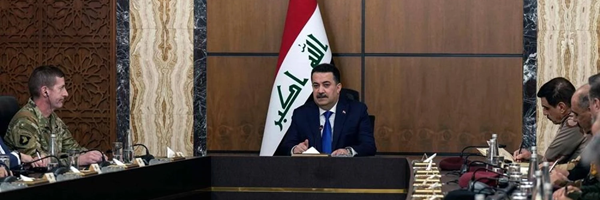Iraqi PM says ‘timetable set’ to end presence of US-led coalition
 The Cradle, April 12, 2024 —
The Cradle, April 12, 2024 —
Iraqi Prime Minister Mohammed Shia al-Sudani, in a column written for Foreign Affairs magazine, says that the joint US–Iraqi Supreme Military Committee has agreed on a timetable to “end” the presence of the US-led international coalition in the country.
“In late January, we formed the High Military Committee, composed of top military officials from both the United States and Iraq, to assess the ongoing threat of [ISIS], the capabilities of the Iraqi security services, and operational conditions throughout the country,” Sudani writes.
“That effort has led to an agreement among all stakeholders to end the international coalition in a gradual and orderly manner on an agreed timetable … Going forward, the High Military Committee will develop a road map for future relations, including the presence of US advisers,” the premier adds, highlighting that the move does not mark a “downgrade” in Iraq–US ties, but rather a “new phase … that goes beyond just security and military affairs.”
Sudani stressed the “delicate balance” Baghdad must achieve between the US and resistance factions that form the Popular Mobilization Units (PMU), who “sometimes enter into direct conflict with American forces.”
He also reiterated that ISIS no longer poses a significant threat to Iraq, a claim that Washington has perpetuated to justify their heavy military presence in the country. “Now, only small ISIS groups remain; they are being pursued by our security forces, across deserts and mountains and into caves, but they no longer pose a threat to the state,” Sudani says, adding that Baghdad needs to redirect resources “from waging wars toward promoting development.”
“Ultimate victory over terrorism is unattainable without genuine development, including a decent standard of health care, education, and other essential services,” the Iraqi premier writes.
Sudani says that a transformation of US–Iraq relations “from a single-faceted one to a comprehensive one” will also allow Baghdad to pursue the guiding principle of its foreign relations, which he called “Iraq first,” stressing that his government seeks to “approach every country on equal terms, so that Iraq does not become an arena for any outside actor to settle scores.”
Such a transformation would also allow Iraq to “work with the United States to defuse crises,” Sudani adds, highlighting that a “comprehensive de-escalation” in West Asia currently hinges on “urgently ending the war in the Gaza Strip and respecting the legitimate rights of the Palestinian people.”
The column, published on 11 April, comes days before the Iraqi premier travels to Washington DC to meet with US President Joe Biden.
While in the US capital, Sudani is expected to discuss the security and defense relationship between Iraq and the US. However, a senior State Department official told Reuters on Friday that this is not the primary focus of the visit.
“[It is] likely to be a very important part of our – of the discussion,” the official said. “It is not the primary focus of the visit … but it is almost certainly going to come up.”
According to the unnamed official, the visit will primarily focus on “the economy and issues including education, environment and US support for development.”
Nonetheless, in his column for Foreign Affairs, Sudani says that his meeting with Biden on 15 April “will be an opportunity to put the US–Iraqi partnership on a new, more sustainable foundation,” adding that “the fight against terrorism will continue to be a central topic for both of our governments.”
About 2,500 US troops remain in Iraq, defying a 2020 parliamentary vote to withdraw permission for the US to operate on Iraqi soil. The vote came in response to the US assassination of Iranian anti-terror commander General Qassem Soleimani and deputy leader of the Popular Mobilization Units (PMU), Abu Mahdi al-Muhandis, in Baghdad.
ISIS has been mounting a “resurgence” in Iraq and Syria ever since local resistance factions began attacking US bases in the region in support of Palestinians in Gaza.
According to an investigation by The Cradle, the US army is playing a crucial role in allowing ISIS to regain ground. Iraqi MP Hassan Salem confirmed “there are thousands of ISIS members in the [Houran Valley] receiving training in private camps, under US protection,” noting US forces have “transferred to this area hundreds of ISIS members of different nationalities.”
